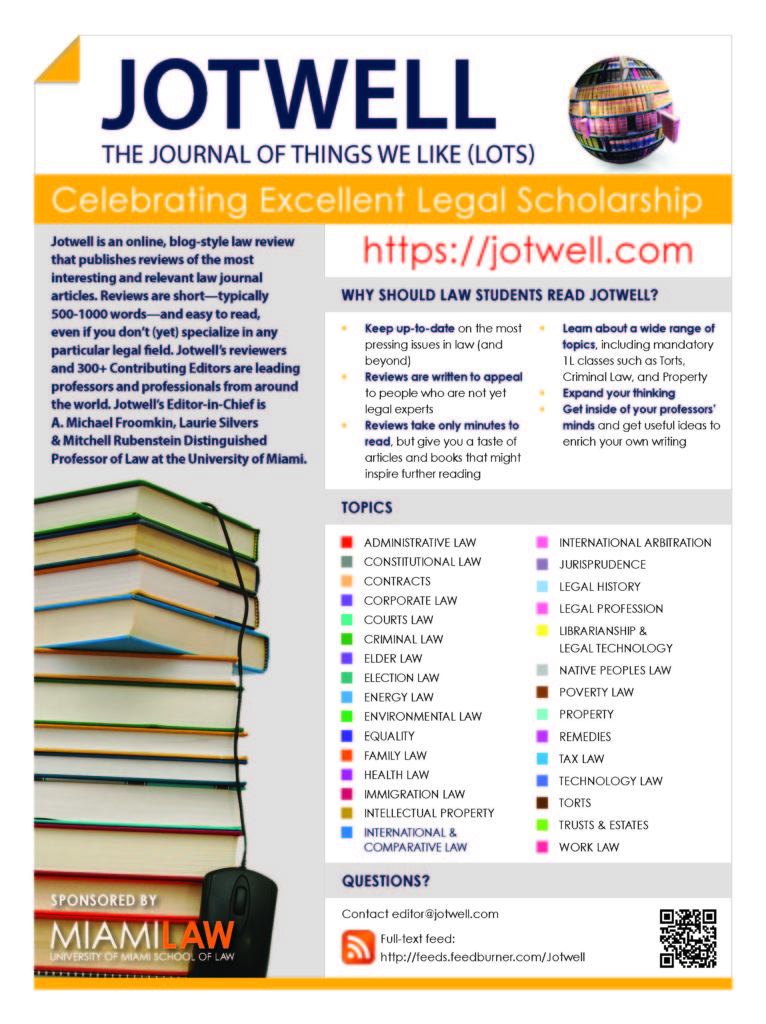Monthly Archives: August 2020
Aug 31, 2020 Gregory KeatingTorts
In Reconceptualising Strict Liability for the Tort of Another Christine Beuermann—a Lecturer in Law at the University of Newcastle—shines new light on strict liability for the wrongdoing of others. In the United States, we generally classify these as vicarious liabilities and non-delegable duties, and we usually conceptualize them in terms of the liability of principals for the acts of their agents. Perhaps surprisingly, these liabilities are at once ancient, very active at present, and poorly understood. Professor Beuermann’s book supplies a badly needed, original, and illuminating framework for thinking about these forms of liability. The book both offers an answer to longstanding theoretical puzzles, and guidance in deciding cases that presently vex the courts. It repays a reader’s careful study by reorienting the reader’s thinking.
Vicarious liability may well be the oldest form of tort liability extant in contemporary tort law. Legal historians often trace it back to Roman law, which held masters liable for the legal wrongs of their slaves, husbands liable for the wrongs of their wives, and fathers liable for the wrongs of their children. Blackstone distanced himself from Roman law’s instantiations, but he saw in them the roots of a more modern and general liability of masters for the torts of their servants. Over time, that liability transformed into the liability of employers for the torts of their employees committed within the scope of their employment. If the broad outlines of the history are clear, both the doctrine and the justification are not. Oliver Wendell Holmes thought that vicarious liability was wrong in principle, if too entrenched to uproot. Modern corrective justice theorists also tend to see the doctrine as anomalous because it is not fault-based. Other contemporary scholars have been more receptive to justifying the doctrine by reference to policies of accident prevention and loss-spreading, or by reference to “a deeply rooted sentiment that a business enterprise cannot justly disclaim responsibility for accidents which may fairly be said to be characteristic of its activities.” Whatever their virtues, these justifications have not been particularly helpful to courts struggling to decide the wave of sexual assault cases that have recently arisen. Why, exactly, is sexual assault a characteristic risk, say, of being a teacher but not of being a school janitor? Continue reading "Authority, Vulnerability, and Strict Liability"
Aug 17, 2020 JotwellJotwell
Jotwell is taking a short summer break. We’ll be back on Monday, August 31. However, even while we’re on break, we’ll be accepting submissions, editing them, and updating various technical parts of the site.
Now that you know how much you miss us, this is good time to ask you to please help support Jotwell; your donation, however small, helps demonstrate the breadth of support for the enterprise.
If you like Jotwell, share — help us find more readers. Tell a friend about Jotwell. And if you are an academic reader, please consider recommending Jotwell to your students. We have a Jotwell Orientation Flyer for students that you can print out and post, or perhaps even hand out at Orientation.

Click for full-size printable version
See you in two weeks, when we start the new, oddly virtual, academic year.
Aug 14, 2020 Daithí Mac SíthighTechnology Law
Laurence Diver,
Digisprudence: the design of legitimate code, 13
Law, Innovation & Technology __ (forthcoming, 2020), available at
LawArXiv.We often say that code is law, but what kind of law is it? Laurence Diver’s new article, Digisprudence: the design of legitimate code, introduces his ‘digisprudence’ theory, associating himself with the welcome emphasis upon design that is seen in particular in current work on privacy (e.g. Woodrow Hartzog’s Privacy’s Blueprint) and in Ian Kerr’s attention to the power of defaults, and doing so in light of a rich body of scholarship, from well beyond technology law, on law and legitimacy.
Code is not law, Diver says, with tongue slightly in cheek. It is more than law, constituting and regulating at the same time, rather than needing interpretation by addressees as law does. Yet it is also less than law, in the absence of, for instance, the possibility of disobedience. Drawing from ideas in the jurisprudential canon, including the morality of law and the more recent ‘legisprudence’ ideas of Luc Wintgens (on core principles for limiting subjective notions of freedom), Diver asks us to think of how ‘constitutional’ ideas such as legitimacy ought to be embedded in the software ‘legislature’, i.e. the contexts and environments for, and methodologies of, the production of software. He is rightly adamant that we must focus on production, arguing that code must be legitimate from the outset rather than often futilely retrofitted once it is in the wild. Continue reading "Code is More Than and Less Than Law"
Aug 13, 2020 Hoi KongInternational & Comparative Law
Duncan Ivison’s Can Liberal States Accommodate Indigenous Peoples? opens with the following questions: “Can liberal democracy accommodate the claims of Indigenous peoples? More precisely: can it do so justly?” (P. 12.) Ivison’s text is a rigorous and elegant response to these questions and essential reading for all who grapple with the circumstances of Indigenous peoples in contexts of “settler colonialism.” (P. 13.)
In the first chapter, Ivison identifies two key features of this form of colonialism. First, it involves “seizure and control of territory” that is justified by reference to “ideologies of civilizational and racial superiority and the denigration of Indigenous political institutions, philosophies, cultural practices and ways of life.” (P. 13.) Second, this process of “political domination and dispossession of territory” is “ongoing” and not a mere remnant of history. (Pp. 13-14.) Continue reading "Indigenous Peoples, Liberal Democracies and Public Reasoning"
Aug 12, 2020 Lee Anne FennellProperty
The lack of affordable housing in our nation’s most generative cities is an ongoing tragedy. The cause is hardly mysterious: incumbent residents—homeowners, sometimes joined by renters—artificially suppress housing supply by blocking development. The result reflects neither the verdict of free markets nor the outcome of democratic processes, but rather political and regulatory dynamics that are powerfully and systematically skewed against change.
In their new article, Professors Roderick Hills and David Schleicher dust off what might seem like just another wonky policy tool, the transferable development right (TDR), and repurpose it as a coalition-building device that can help unstack the political deck to facilitate development. Continue reading "Bundle and Conquer"
Aug 11, 2020 Adam N. SteinmanCourts Law
Few would mistake One First Street for a comedy club. Sure, it may be hard to get a ticket sometimes, but at least there’s no two-drink minimum once you get in. Am I right? Is this thing on?
But seriously, folks. For years now, some Supreme Court aficionados have taken a particular interest in oral argument humor. Jay Wexler’s @SCOTUSHUMOR Twitter account keeps regular stats on how often each Justice triggers [LAUGHTER] in an argument transcript. (He was on this beat before Twitter existed, in fact.) Wexler’s laughter rankings garnered a full Adam Liptak article in the New York Times, and Justice Breyer referred to them in a speech last Fall.
This all may seem like something on the lighter side of the Court-watching world, but it’s not immune from rigorous quantitative analysis. And that is exactly what Tonja Jacobi and Matthew Sag bring to bear in their fascinating article. They created a database of every argument transcript over a 63-year period, identifying more than 9000 incidents of laughter. They devised a method to account for the delay between a laughter-inducing event and the point at which “the laughter reaches the threshold of disruption that causes the court reporter to make a note of it.” (Comedy is all about timing, after all.) They deployed several approaches to the denominator problem, measuring laughter rates on a per-argument basis and as a function of each “speech event” and even the number of words spoken. And they cleansed the data of those instances where “laughter” lurks in less jovial words like “manslaughter.” Continue reading "No Laughing Matter"
Aug 10, 2020 Brian FarkasLexInternational Arbitration
Andrew B. Mamo,
Three Ways of Looking at Dispute Resolution,
54 Wake Forest L. Rev. 1399 (2019), available at
SSRN.
Advocates of alternative dispute resolution (ADR) often talk about the “ADR Movement” as if it were…well…an actual movement. We know what the phrase means, or at least we think we do. Since the 1970s, the popularity of extra-judicial mechanisms for conflict resolution–arbitration, mediation, negotiation, and restorative justice–has risen sharply. Over the same period, these procedures have become highly professionalized areas of study and practice. But is there a coherent “ADR Movement,” with a capital “M,” based upon a unified legal philosophy?
Not so much. In his comprehensive article, Three Ways of Looking at Dispute Resolution, Andrew Mamo carefully unravels the divergent philosophical strains that have supported the expansion of ADR over the past half-century. He explains the history of ADR against the broader backdrop of American legal and political history. Continue reading "Towards a Unified Theory of ADR"
Aug 7, 2020 Aiden ParkLegal Profession
The splendors of rural America outnumber the stalks of wheat that spill down the Great Plains, the time-worn, sleepy peaks of Appalachia, the saguaro cacti whose sunbaked resolve outlasts generations of western settlers. Indeed, approximately 97 percent of U.S. land is within rural counties, capturing wonders throughout this nation’s countryside. But while a large swatch of America preserves the pastoral, one aspect is noticeably absent from this bucolic ideal: lawyers.
In Rural Practice as Public Interest Work, Hannah Haksgaard first establishes that there is a profound lack of rural lawyers, especially when compared to the “glut of lawyers in urban areas.” (P. 213.) Such a dearth exacerbates rural residents’ inability to access justice and to satisfy crucial legal needs. Essentially, Haksgaard asserts, there is a need for every type of attorney in rural areas: prosecutors, public defenders, immigration attorneys, divorce lawyers, bankruptcy lawyers, trusts and estate lawyers, and many more. Continue reading "Reframing Rural Private Practice Work"
Aug 6, 2020 Nate HoldrenLegal History
Despite ideological use of terms like “free market,” people are not free to leave capitalism: capitalism is socially compulsory. Ideologists of capitalism sometimes mask this reality by trying to render capitalism the entirety of our conceptual horizon, so that it becomes impossible to think outside of capitalism. When that happens, capitalism comes to be taken for granted rather than treated as a historically contingent and socially-imposed set of constraints. One of the things that history can do is to examine when capitalism arose and how it became compulsory. Rose Parfitt’s new book is precisely this kind of critical history.
This book centers on Italy’s invasion of Ethiopia in 1935 and the ways it has been understood in international law since the end of World War Two. The invasion has been typically treated as a failure of law, as Parfitt demonstrates in a survey of scholarship by historians and international law scholars. The League of Nations let the invasion happen, the typical account goes, and the League’s failure to act must inform the creation and practice of better international legal institutions. Parfitt argues, however, that the legal facilitation of Italy’s annexation of Ethiopia did not arise from particular qualities of the League but from elements of international law more broadly. The force of the argument is that present international law is not so fundamentally different from the League of Nations after all. As Parfitt underlines, the world has witnessed many invasions since the Ethiopian crisis, under what is ostensibly a very different organization of international law and set of institutions. The typical narrative of Italy’s invasion, Parfitt argues, has defended rather than prevented military actions, especially by the US and European countries against formerly colonized countries. Parfitt thus argues that there is far more continuity between the League of Nations era and more recent international law than the typical story admits. She further argues that claims to strong differences between the League and present institutions end up inadvertently offering rhetorical support to war. Continue reading "A Critical History of the Complicity of International Law"
Aug 5, 2020 Alex B. LongWork Law
I haven’t taught the basic Employment Law survey course in a few years, so I was updating my class notes relating to the kinds of pre-employment screening measures that many employers use. The casebook had a note about so-called ban-the-box measures—state laws that require employers to remove questions about criminal histories from a job application. I decided to do a little research into the subject when – lo and behold – I stumbled across one of those articles that helps an instructor add some value to the class while simultaneously making a practical contribution to the scholarship in the field.
Do Ban-the-Box-Laws Really Work? by Dallen Flake takes a look at the practical effect of ban-the-box laws. The article begins with an overview of the rise in these types of measures in recent years and the different approaches that the measures take. The ban-the-box laws reflect a recognition of the difficulties that those with arrest and conviction records often face in seeking to find employment. Much like the Americans with Disabilities Act’s prohibition on disability-related inquiries at the pre-offer stage, ban-the-box measures delay the ability of employers to inquire about an applicant’s criminal history. As Flake explains, “The hope is that an employer will be more likely to hire an ex-offender if it evaluates a candidate’s qualifications for the position before discovering the applicant’s criminal record.” (P. 1084.) Continue reading "The Impact of Ban-the-Box Measures"















